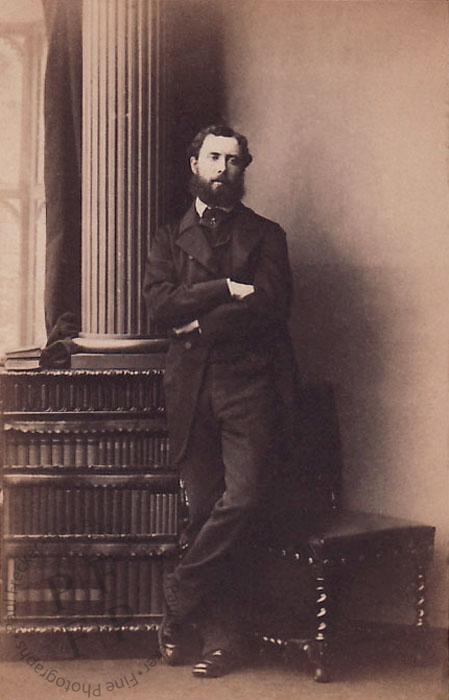John St Aubyn
(1829-1908)
1 November 1860
Volume 2, page 70, sitting number 1577.
Born John St Aubyn on 23 October 1829, his father was Sir Edward St Aubyn, who in 1866 gained the title 1st Baronet St Aubyn, of St Michael’s Mount, Cornwall.
John St Aubyn succeeded his father in 1872 as the 2nd Baronet, and in 1887 was raised to the peerage as 1st Baron St Levan.
Lord St Levan died at the Cavendish Hotel in Eastbourne on 14 May 1908 at the age of 78, leaving an estate valued at £157,753.
An obituary appeared the following week in the Royal Cornwall Gazette (21 May 1908). 'Lord St Levan, of St Michael's Mount, Cornwall, died at 11.20 on Thursday night at Eastbourne. Lord St Levan was the eldest son of the late Sir Edward St Aubyn by Emma, daughter of the late General William Knollys, and was born at Clowance on October 23rd, 1829, and succeeded to the baronetcy on the death of his father in November, 1872. Educated at Eton and Trinity College, Cambridge, he distinguished himself at college, taking his B.A. degree in 1852. On the death of Mr Michael Williams, in 1858, a vacancy occurred in the representation of West Cornwall, and Lord St Levan, then Mr St Aubyn, was elected a Liberal without opposition, and continued to represent the division until 1885. Under the Redistribution Act of 1885 West Cornwall was divided, and at the general election of that year Sir John St Aubyn stood as Liberal candidate for St Ives Division. For the first time for a period of some 27 years he had to fight for his seat, and was returned by a majority of 737. When Mr Gladstone introduced his first Home Rule Bill Sir John joined the Liberal Unionist party. At the general election of July, 1886, he was opposed by Mr Barron, of Lambeth, Home Ruler, but was returned by a majority 2,507. In July, 1887, Sir John was elevated to the peerage as Baron St Levan, and he exchanged his seat in the House of Commons for another in the House of Lords, having represented West Cornwall in the Liberal and the Unionist interests for 29 years.
'He was a justice of the peace for the county of Cornwall, and was appointed Deputy-Lieutenant for Cornwall in July, 1854. and Special Deputy Warden of the Stannaries in July, 1860. In 1853 he joined as lieutenant the 3rd Battalion Duke of Cornwall’s Light Infantry, then designated the Royal Cornwall Rangers Militia. In 1855 he obtained his captaincy, and in the following year was promoted to the rank of major. On the re-organisation of the volunteer force in 1881 Lord St Levan was appointed captain of the Marazion Artillery Volunteers. In 1882 he was promoted lieutenant-colonel, becoming full colonel the same year. Two years later he retired, having served continuously with the militia for a period of over 30 years.
'During the municipal years of 1891-2-3 Lord St Levan served as Mayor of Devonport. His father, Sir Edward St Aubyn, had held the office many years before, when Devonport was created a Corporation, and presented the town its handsome official chain. Sir John St Aubyn presented to the town a valuable collection of minerals, illustrative of the geology and mineralogy of Cornwall. Since 1850 the Church of England in Stoke Damerel has benefited by grants in money and land from the St Aubyn estate to the amount of nearly £40,000. Lord St Levan married in 1856 Lady Elizabeth Clementina, second daughter of the fourth Marquis Townshend, by whom he had fourteen children, of whom several survive. On July 15th, 1908, Lord and Lady St Levan celebrated their golden wedding in London.'

